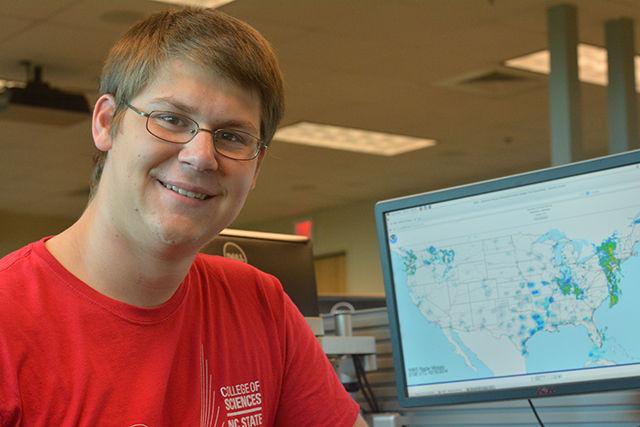Alexandra Goodfred
Correspondent
For students who never know what the weather will be like, there is a new Facebook page run by an NCSU student dedicated to helping out. Michael Scanlan, a senior in meteorology, runs a blog, a Facebook page and a Twitter account dedicated to reporting the weather, which all share the name MiScan5000. He advises students on what to expect outside and what they should put on to better cope with the weather, knowing that students appreciate not having to think about how to dress in the morning and knowing what to bring with them.
“About a year and three months ago I started a weather blog, and I just loved talking about weather and in all of my classes I’ve been the ‘resident meteorologist’,” Scanlan said. “So whenever teachers, or students, or fellow classmates had any questions about the weather they would be like ‘So, Michael, what’s the weather going to be tomorrow?’”
Scanlan said he has always loved talking about weather. Born in Florida, Scanlan moved up to North Carolina 18 years ago and said he had always been a cloud- watcher.
“[I’ll] just be driving down the road, and I’ll get distracted because I’ll look up at the clouds and say ‘Hey, look, that’s cool,’” Scanlan said.
According to Scanlan, reporting does not take up too much time, though it depends on how detailed of a post he creates.
“For the MiScan5000 blog posts, those typically take about an hour to do, but for the Facebook posts, it’s like 15-20 minutes,” Scanlan said.
Scanlan said that he does not typically receive negative comments on his forecasting, though he got one recently on the Wolfpack Students Facebook page regarding his statement that there would be a slight chance of rain at 10:00 a.m. October 14.
“I want to get better at forecasting. I’m in a class right now, Synoptic Forecasting and Analysis, which is strictly based on learning how to create more accurate forecasts,” Scanlan said. “Through that class I’m able to look at more variables, to look at more things the atmosphere that would change the amount of precipitation, or wind speed, or temperature or different atmospheric variables, so I’m able to make a more accurate forecast.”
According to Scanlan, his posts get a range of viewing numbers depending on how interesting the topic is for the students who would be reading them. He said depending on how many different places he posts a report, his blog garners anywhere from 40-300 views on his blog, though Facebook can be hit or miss.
“The first couple I had about 200-250 views, the post about the rain [Tuesday] got over 3,000 views, the lunar eclipse post I made on my blog got over 100 views and my game day and tailgating coverage also got big views,” Scanlan said.
For publicity, Scanlan said he relies on his friends to share his posts
“At this point, because I’ve been doing this for long enough, people know I’m gonna be posting it soon and so they’ll actually be looking for it,” Scanlan said.
When comparing it to her usual weather source, weather.com, Aparna Arigala a sophomore in biological sciences, found MiScan5000 to be more user-friendly. According to Arigala, Scanlan’s blog and Facebook were very convenient, and she felt the Facebook page was helpful if she wanted a quick update that was all in one place.
“I like how the Facebook page is fairly concise, and the blog is detailed, and I like how the blog is organized,” Arigala said. “It’s cool if you want to learn about stuff like the lunar eclipse, and the gameday forecasts are convenient. The advice section he has at the end of the gameday section is nice, and the site has a good amount of info.”
According to Scanlan, to make forecasts for the MiScan5000 Facebook page, he does ensemble forecasting, which involves looking at what the different websites, such as WRAL, Accuweather, the National Weather Service, weather.gov and Weather Underground. He does go more in depth for his blog posts, looking at different models and programs in addition to looking at forecasts to see what might happen.
“My end goal is to work for the National Weather Service in Miami and be an operational hurricane forecaster. I’ll be forecasting for when the hurricane is going to hit, how fast it’s going to be [and] whether evacuations need to be made,” Scanlan said. “That’s where I want to end up, but that’s a while down the road.”





